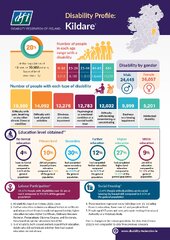Disability Profile - Kildare
Issued on October 22 2024
Disability Profile[1]: Kildare
20% of the population, or 50,502 people, have at least one disability
24,445 males, and 26,057 females have at least one disability
5,313 people 0-14 years old have a disability
6,195 people 15-24 years old have a disability
11,513 people 25-44 years old have a disability
14,446 people 44-65 years old have a disability
13,035 people over 65 have a disability
Type of Disability
19,980 people have difficulty with pain, breathing or any other chronic illness or condition
14,092 people have difficulty with basic physical activities
12,783 people have a psychological or emotional condition or a mental health issue
13,276 people have blindness or a vision impairment
9,999 people have Deafness or a hearing impairment
12,032 people have difficulty with learning, remembering or concentrating
5,201 people have an intellectual disability
Education Level Obtained[2][3]
4% of people with disabilities had no formal education, compared to 1.66% of the general population
10% of people with disabilities had only a primary school education, compared to 4.76% of the general population
30% of people with disabilities had only a secondary school education, compared to 24.94% of the general population
12% of people with disabilities had completed further education, compared to 10.97% of the general population
27% of people with disabilities had completed higher education, compared to 34.41% of the general population
9% of people with disabilities were still in education, compared to 11.79% of the general population
38.67% of people with disabilities over 15 are in employment[4], compared to 50.08% of the general population
12.69% of people with disabilities are in social housing[5] (by household) compared to 8.61% of the general population
Due to changes in the census questions, the data from Census 2022 is not comparable to data from previous censuses
[1] All statistics based on Census 2022, cso.ie
[2] Further education includes vocational/technical certificate and advanced certificate/completed apprenticeship, higher education includes Higher Certificate, Ordinary/Honours Bachelor, Postgraduate Diploma/Degree, and Doctorate. Data based on special tabulation from CSO.
[3] % of all adults, both ceased and not ceased their education. Adults who did not indicate whether they had ceased education are not shown.
[4] These numbers represent every individual over 15, including those in education, those over 65 and people retired.
[5] People aged 15 years and over, who were renting from a Local Authority or a Voluntary Body.

